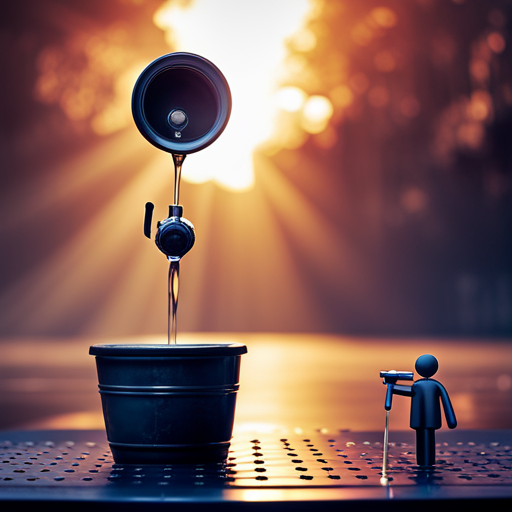Are you receiving hot water from your reverse osmosis (RO) unit? If so, you might want to pay attention to this article.
While RO systems are known for providing clean and safe drinking water, hot RO water can pose a significant threat to your health. In fact, hot RO water can damage the pre-filters and semi-permeable membrane of the RO unit, which can compromise the water quality and put you at risk of consuming harmful contaminants.
But what causes hot RO water in the first place? This is a common question among many homeowners who have installed RO systems.
In this article, we’ll explore the main causes of hot RO water and why it’s crucial to prevent it from happening. We’ll also discuss the potential dangers of consuming hot RO water and provide you with practical tips on how to fix this issue.
So, buckle up and get ready to learn how to say goodbye to hot RO water and hello to clean and safe drinking water!
Key Takeaways
– Hot RO water can damage pre-filters and semi-permeable membrane, compromising water quality and risking harmful contaminants.
– Hot water can cause filters to break down faster, leading to more frequent replacements and potentially less clean water.
– Increased pressure from clogged filters can cause water temperature to rise, leading to growth of harmful microorganisms.
– Consistently hot RO water should be addressed promptly to prevent damage to pre-filters and semi-permeable membrane.
Causes of Hot Water
If your reverse osmosis water is hot, it could be due to clogged filters, plumbing issues, nearby heaters, or heating vents or pipes. Plumbing issues, such as a malfunctioning valve or a broken pipe, can cause hot water to flow into the RO system.
Nearby heaters or heating vents can also raise the temperature of the water, resulting in hot RO water. Regardless of the cause, hot RO water can damage the RO membrane and compromise the quality of your drinking water.
The pre-filters and semi-permeable membrane of the RO unit are designed to work with cold or room temperature water. If the water is consistently hot, it’s important to identify and fix the underlying issue to prevent further damage to the RO system and ensure safe drinking water.
Effects on Water Quality
To ensure the quality of your purified water, it’s important to prevent any factors that may compromise its effectiveness in eliminating contaminants. One of these factors is high temperature. Hot RO water can have a negative impact on the quality of your drinking water, and it’s vital to take this issue seriously. Here are four reasons why:
1. High temperature can damage the RO membrane, which is responsible for filtering out impurities from your water. When the membrane is compromised, it becomes less effective in blocking contaminants, allowing them to pass through and enter your drinking water.
2. Hot water can cause the filters to break down faster, requiring more frequent replacements. This can be costly and time-consuming, and it also means that your water may not be as clean as it should be.
3. Increased pressure from clogged filters can cause the temperature of the water to rise. This not only damages the RO membrane but can also lead to the growth of bacteria and other harmful microorganisms in your water.
4. Warm water can also affect the taste and smell of your water. This is because higher temperatures can cause chemicals and minerals in the water to break down, altering its flavor and odor.
It’s crucial to maintain the integrity of your RO membrane by keeping the temperature of your water at a safe level. If you’re experiencing consistently hot RO water, it’s recommended that you contact the manufacturer or an expert to address the issue promptly.
What to Do if Water is Hot
Addressing the issue of hot purified water is crucial for ensuring that your reverse osmosis system is working effectively and keeping your family healthy. If you notice that the water coming from your RO unit is hot, it’s important to take action immediately to prevent damage to the pre-filters and semi-permeable membrane.
The first step in troubleshooting this issue is to check the temperature of the water going into the RO unit. Make sure that it’s cold or at room temperature, and avoid connecting the unit to hot water sources such as nearby heaters or heating vents.
If the water going into the RO unit is at the correct temperature, the next step is to check for clogged filters. Clogged filters can cause the water to heat up due to increased pressure, so it’s important to change them regularly to prevent this issue.
If the filters are not the problem, it may be necessary to contact the manufacturer or an expert to diagnose and fix the issue.
By taking these steps to prevent damage and troubleshoot the issue of hot purified water, you can ensure that your reverse osmosis system is producing clean and safe drinking water for you and your family.
Conclusion
So, now you know why hot RO water is a serious concern and why it’s important to prevent it from happening.
Remember, hot water can damage the pre-filters and semi-permeable membrane of the RO unit, which can compromise the quality of your drinking water. Additionally, drinking hot RO water can expose you to harmful contaminants that could have been eliminated if the water was not heated.
To prevent hot RO water from occurring, ensure that your RO system is installed correctly and maintained regularly. If you notice any issues with your RO unit, such as hot water or a change in water quality, contact a professional to address the problem promptly.
By taking these steps, you can ensure that your drinking water is always clean, safe, and free of harmful contaminants.
